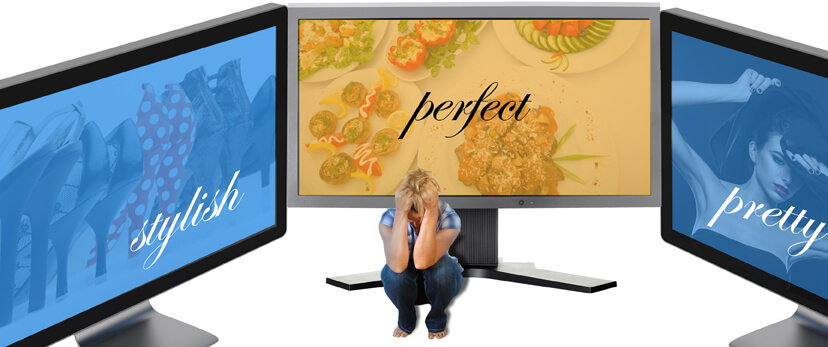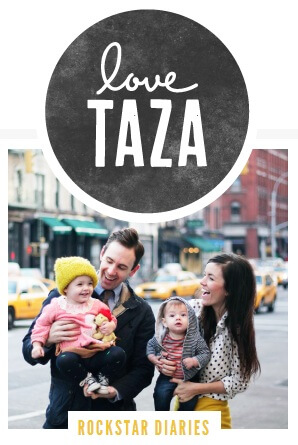

Social Media
The New Shaming: How Pinterest Makes Us Miserable
It used to be fashion magazines that made us insecure. Now it’s lifestyle blogs and Pinterest. We ask why and what can be done about it.
This article was made possible because of the generous support of DAME members. We urgently need your help to keep publishing. Will you contribute just $5 a month to support our journalism?
Are lifestyle blogs the new fashion magazines? While the glossies have long been criticized for their role in body-shaming and causing women to question their exteriority, many lifestyle blogs spur anxiety about our interior, domestic selves. Are we doing enough? Are we living well?
The term “Marthette” was coined two years ago by Jezebel’s Sadie Stein as she chronicled her descent into the lifestyle blog K-hole. It refers to bloggers who have gained a following from posting images of their craftsy, beautiful, fashionable lives. “Our moms had Martha to make them feel inadequate. But we have a whole new generation of perfection which is rapidly proliferating online,” Stein writes. More recently, LA Weekly’s Ali Trachta, wrote an article entitled “Pinterest Makes Me Feel Like I’m Bad at Being a Woman.” Similarly, Philadelphia Magazine’s Robin Rasking lamented that “Facebook and Pinterest Make Me Feel Like a Crappy Mom.” Even photographers are starting to lash out, specifically against the wedding blog mafia.
These insecurities and frustrations are understandable. Spend an hour surfing Cupcakes and Cashmere or Oh Joy! and you’ll be acutely aware that you’re not spontaneously whipping up chocolate-chip pumpkin muffins or refurbishing vintage dressers with mismatched jeweled handles from Anthropologie. Pinterest is a huge culprit. It’s a great source of inspiration for design and fashion, and more relatable than pristine magazine layouts, but it also often leaves women feeling inadequate.
So the question is: Do these blogs inspire or make us miserable? And if we do feel insecure as a result, why do we keep reading?
 Well, we read because the blogs are pretty, Pinterest especially. The impeccably-dressed family of the Rockstar Diaries is endlessly charming. The brunches and holiday table centerpieces on Cupcakes and Cashmere appear effortlessly chic. It’s an escape for many—it’s fun to daydream about giving your bedroom a makeover. But what happens when you compare yourself to these women? After all, these bloggers are often women with jobs, relationships, families—lives outside of the pretty photographs on their blogs. And they edit their stories. It’s dangerous to measure yourself against the lives of others at the best of times but even more so when those lives are on the Internet.
Well, we read because the blogs are pretty, Pinterest especially. The impeccably-dressed family of the Rockstar Diaries is endlessly charming. The brunches and holiday table centerpieces on Cupcakes and Cashmere appear effortlessly chic. It’s an escape for many—it’s fun to daydream about giving your bedroom a makeover. But what happens when you compare yourself to these women? After all, these bloggers are often women with jobs, relationships, families—lives outside of the pretty photographs on their blogs. And they edit their stories. It’s dangerous to measure yourself against the lives of others at the best of times but even more so when those lives are on the Internet.
According to a paper entitled “Misery Has More Company Than People Think,” published in the Personality and Social Psychology Bulletin in January 2011, people overestimate the happiness of their friends and underestimate their sadness. The study found that students who thought their friends experienced more happiness ended up feeling worse about their own lives. In other words, the happiness we perceive in others actually brings us down and is linked to loneliness. “Thinking you’re alone in your emotional challenges is, understandably, not much fun,” said Alex Jordan, the Stanford psychology phD student who led the study.
Similarly, when it comes to the blogosphere, for every well-lit photo are dozens of moments that aren’t blog-worthy. According to Franca of the oranges & apples blog, the key is to not put so much stock in these apparently perfect lives online.
“I look at lifestyle blogs not as templates of what I should/could/will do myself, but as entertainment providing a much more diffuse form of inspiration,” she says. “Something might stick, but if it does it will be organic and not something I consciously plan to copy. I don’t feel inadequate because the bloggers with the most seemingly perfect lives are so unlike me I would never expect to keep up. I can happily read about the lives of 21-year-old-millionaires or Mormon stay-at-home mothers of four without feeling any pressure. But if my friends start talking about their baking triumphs or whatever, it might be different.”
The issue for many readers is that bloggers do feel like friends sometimes. Blogs are intimate by nature. We become privy to the blogger’s tastes, thoughts and often their personal lives. Readers follow their favorite bloggers for years, watch them gain popularity and commercial sponsorship even until the women who once seemed relatable begin to feel out of reach.
Personal style blogger Rachel Nguyen of That’s Chic admits that she got caught up in her commercial success to some extent. “We connect better when you talk about your life— it’s almost like spilling out to an old friend,” Nguyen says. “I feel like the past year all I was doing was posting outfit pictures, and I lost the integrity of my blog for a bit.”
The remedy, Nguyen says, is for bloggers to take it back to basics and share a bit more of the everyday details of their life. As glamorous as life might look from the outside, “it’s not all about this materialistic shit that we post about all the time. Everyone gets really caught up in that,” she says. “You can’t compare your life—this is content that’s being curated.”
Bloggers feel insecure, too, by the way. Franca admits a creeping anxiety when it comes to wedding blogs. On her blog she wrote, “All I want [for my wedding] is a low key party and still I look at these things and think: maybe I should make jam and present it in dainty glasses with handwritten labels as favors? Maybe I should sew napkins from vintage fabrics collected over months and years?”
Upon reflection, she feels that the source of the insecurity is ignorance. She tells DAME that “insecurities are more likely if you are new to a subject. I knew very little about weddings when I got engaged, so reading the blogs and discovering all the things I didn’t know I was meant to be doing was a big part of what made me a feel a bit inadequate. “
Would readers feel less insecure if bloggers exposed these vulnerable moments? Alex Jordan believes so. “In moderation, yes,” he says. “Obviously we feel empathic sorrow when we hear about other people’s suffering, and it can be mood-boosting to hear about our friends’ triumphs instead. But recognizing that disappointment and sadness are everyday, shared experiences can help us dwell less on these things in our own lives.”
There are, of course, many blogs that do this. Take this heartbreaking post from Heart of Light, chronicling the tragic accident of blogger Rachel’s stepfather and the yearly updates of how her family takes care of him. It’s a post that many women can relate to – behind the cakes and parties are the heartbreaks and struggles that so many people endure day to day, and readers can find comfort in relating to someone whose experienced something similar. Bloggers are people, just like us.
If this sounds like the “Celebrities—they’re just like us!” stories that tabloids run, then it’s no accident. Nguyen say that she has encountered readers who seem more starstruck by their favorite bloggers than by celebrities. “I think it’s because [readers] are so involved with their life—glamorized or not,” she says. While the Internet can make regular people seem larger than life, the truth is another story. Nguyen admits that most days she wears a T-shirt and jeans.
We know that fashion magazines are selling an illusion of beauty at this point, because the Internet has waged war against their use of Photoshop and airbrushing. (The Jezebel series of Photoshop horrors is one of many attacks). So now young girls who browse through Vogue or even Seventeen are armed with the knowledge that it’s absurd to compare themselves to the model on the cover. Is it time for a similar campaign of awareness for Pinterest?
Perhaps most importantly, our perspective could be broader. This is Franca, on her blog: “Maybe its not just about pointing out that perfection is not necessarily as perfect as it at first appears, and for people with Martha-like tendencies to occasionally show their vulnerable side. Maybe its more important to also about find alternative definitions of what constitutes a perfect life.”
And indeed there are—who’s to say that the pastel-laden, vintage-inspired aesthetics that dominate the most popular blogs are indicative of life worth envying? Perhaps we can find bloggers whose tastes align with ours, whose lifestyles may not be the kind that brands and designers are rushing to sponsor. The Internet is a big place.
Perhaps if we took all those pictures and stories with a grain of salt, and a touch of humor, maybe, just maybe, we could avoid the trappings of comparison and who knows, feel inspired…
Aylin Zafar is a reporter living in New York whose work appears in Time, The Atlantic and others. You can find her on Twitter @azafar, or at www.aylinzafar.com
Before you go, we hope you’ll consider supporting DAME’s journalism.
Today, just tiny number of corporations and billionaire owners are in control the news we watch and read. That influence shapes our culture and our understanding of the world. But at DAME, we serve as a counterbalance by doing things differently. We’re reader funded, which means our only agenda is to serve our readers. No both sides, no false equivalencies, no billionaire interests. Just our mission to publish the information and reporting that help you navigate the most complex issues we face.
But to keep publishing, stay independent and paywall free for all, we urgently need more support. During our Spring Membership drive, we hope you’ll join the community helping to build a more equitable media landscape with a monthly membership of just $5.00 per month or one-time gift in any amount.
















































































